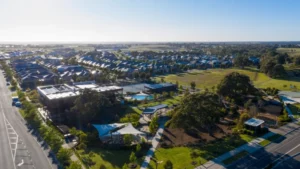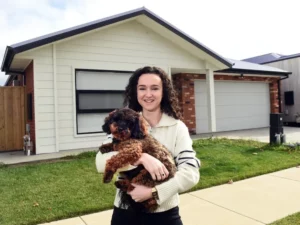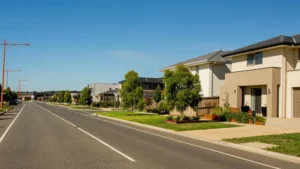
Villawood Properties’ Armstrong Creek development is offering essential workers a discount to build their own home dream.
Victorian nurses, teachers, cops and firefighters are among the essential workers being offered a $35,000 discount to build their home dream.
Developer Villawood Properties is slashing the cost of a block of land in their estates for care workers in a bid to help connect them with housing in areas where their services are needed but where they struggle to afford a home.
Executive director Rory Costelloe said the $35,000 was a $15,000 extension to an existing offer his company had offered to care workers across the past six years, and a nod to their 35th year in business.
“We started with $20,000, and it wasn’t cutting the mustard now that prices have gone up,” he said.
“But you have to try and care for them if you are expecting them to care for you.”
The scheme is available at estates in Melbourne’s north, west and in Geelong.
So far it has already handed out $4.6m to 300 care workers around the state, with applicants means tested and required to live within about 11km of where they work.
In launching the expanded funds, Villawood noted Australia Bureau of Statistics data shows care workers are paid as much as $21,000 less than the average yearly wage.
Occupational therapist Beth Crosby is among those to use the Care Workers Support Program and said she had dreamt of a house for four years before doing so.
“I had tried to get in before that, when I was working five casual jobs, but it wasn’t seen as full-time by the banks,” she said.
Even after she graduated and was working full time, the entry-level wage of her profession meant she would have either had to delay her home dream or gone much further from her job.
But after moving into the now finished home midway through last year, she said she “absolutely loved it”.

Beth Crosby took up the $20,000 discount offer on a block of land in a Villawood Properties estate that helped get her on the path to building a new home.
Ms Crosby said there could even be benefits in the government taking steps to assist young buyers who work for the benefit of their community.
“It makes sense, I know a lot of young people aren’t looking at buying homes anymore,” she said.
She also lamented she was aware of other young would-be homebuyers who had lost their deposit after interest rate rises had cost them the borrowing capacity needed for their home dream.
Last week the nation’s biggest bank agreed to back buyers of off-the-plan apartments and townhouses with deposits as small as $10,000.
The Commonwealth Bank will recognise the tiny deposit when used through developers signed up for a regulated trust account run by Coposit, effectively allowing buyers to save the balance of their required deposit while the project is built.

300 care workers have already taken up the offer with Villawood Properties.
Commonwealth Bank property and construction finance general manager Michael Bennett said for some it would mean being able to lock in a price rather than watch the market run away from them.
“Instead of someone have to save up that whole amount for a longer time, they can instead save up during the construction period,” Mr Bennett said.
“It’s really to support those buyers who don’t want to wait 24 months to save a that deposit.”
It should also mean faster construction starts for developments from townhouse complexes to apartment towers, with the prospect developers would be able to get construction finance from the bank sooner than if they had to wait for buyers to save deposits.
Mr Bennett added that in the past few months they had seen an increase in tenders for finance from developers looking to start building, particularly in Victoria and NSW.
“We do see that the development cycle will ramp up over the next three years,” he said.
The developer and bank moves are among the first to be made since both state and federal budgets offered no incentives to the homebuyers being asked to fund construction of hundreds of thousands more homes across Victoria in a bid to beat the state’s housing crisis.
Mr Costelloe said the state government’s goal to build 80,000 new homes a year for the next decade was “fanciful”, particularly if they pursued current plans to build 70 per cent of those homes at in-fill sites and only 30 per cent on urban fringes.
He noted that in order to boost apartment numbers the government would need to bring in stamp duty concessions for off-the-plan homes, and if increasing land supply for housing in affordable areas wasn’t a factor in the coming years home prices would surge and affordability issues would grow worse.
Source: realestate.com.au










